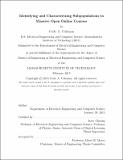Identifying and characterizing subpopulations in massive open online courses
Author(s)
Coleman, Cody A
DownloadFull printable version (13.92Mb)
Other Contributors
Massachusetts Institute of Technology. Department of Electrical Engineering and Computer Science.
Advisor
Isaac Chuang.
Terms of use
Metadata
Show full item recordAbstract
The large and diverse student populations in Massive Open Online Courses (MOOCs) present an unprecedented opportunity to understand student behavior and learn about learning. A tremendous amount of information on students is collected by logging their behaviors. However, despite this wealth of data, little has been done to identify important subpopulations and understand their strengths and weaknesses. This thesis focuses on the potential of various learner subpopulations to succeed and contribute to the course. First, I investigate teacher enrollment in 11 MITx MOOCs showing that teachers represent a potentially large and untapped resource. Depending on their expertise, teachers could provide additional instruction or guidance to struggling students or a way to extend the reach of MOOCs into traditional classrooms. They could also provide MOOCs with another source of revenue through accreditation opportunities. Second, inspired by the phenomenon widely known as the "spacing effect," I look at how students choose to spend their time in 20 HarvardX MOOCs in order to identify observational evidence for the benefits of spaced practice in educational settings. While controlling for the eect of total time on-site, it is shown that the number of sessions students initiate is an important predictor of certification rate, particularly for students who only spend a few hours in a course Finally, by adapting Latent Dirichlet Allocation, I discover probabilistic use cases that capture the most salient behavioral trends in a course. Not only do these use cases provide insights into student behavior, they also serve as an eective method of dimensionality reduction for additional analysis and prediction. Together, the studies in this thesis represent a step forward in digital learning that illuminates subpopulations that are important to the future success of MOOCs.
Description
Thesis: M. Eng., Massachusetts Institute of Technology, Department of Electrical Engineering and Computer Science, 2015. This electronic version was submitted by the student author. The certified thesis is available in the Institute Archives and Special Collections. Cataloged from student-submitted PDF version of thesis. Includes bibliographical references (pages [105]-115).
Date issued
2015Department
Massachusetts Institute of Technology. Department of Electrical Engineering and Computer SciencePublisher
Massachusetts Institute of Technology
Keywords
Electrical Engineering and Computer Science.